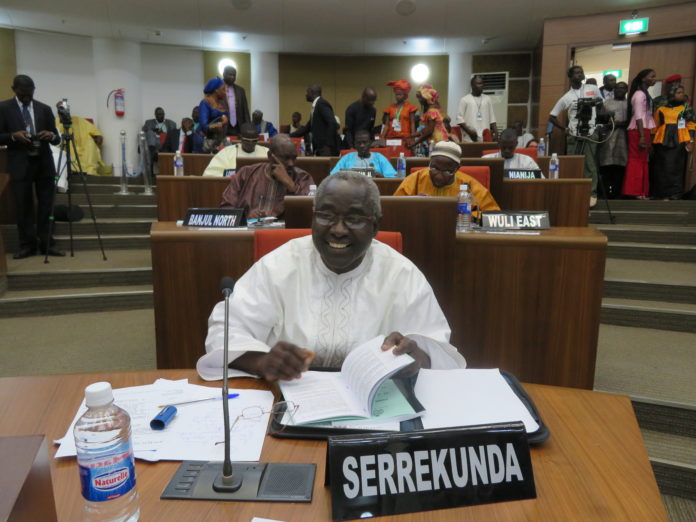By: Kebba AF Touray
Gambia’s Parliamentarians yesterday March 25th 2019, adopted the Africa, Caribbean and Pacific and European Union (ACP-EU) annual Parliamentary report.
Laying the report before Lawmakers, the Member for Serrekunda and head of the Gambian parliamentary delegation Halifa Sallah, said the report aims to capture the developments which were engendered by the implementation of the provisions of the instruments and mechanisms governing ACP-EU relations, as well as to identify the functions and relevance of the parliamentary organ of the cooperation, and to propose resolutions and recommendations, in order to ensure Gambia’s effective participation in defining and promoting the principles and strategic objectives of the partnership.
Sallah told his colleagues that the ACP was created by the George Town Agreement of 1975, and in November 2004, ACP member countries participating in the 8th session of the ACP-EU Joint Parliamentary Assembly, adopted the Charter of the ACP to make the ACP-EU Parliamentary Assembly functional.
Halifa referred to Article 2 of the Agreement which he said indicated that the ACP shall among other things, ensure the realization of the objective of the Lomé Convention, to coordinate the activities of the ACP States in the application of the Convention of Lomé, determine joint positions of the ACP group vis-à-vis the EEC on matters covered by the Lomé Convention, as well as to promote and strengthen the existing solidarity of the ACP Group.
On Political Party Financing, Sallah said the ACP resolved that whereas funding for political parties is derived from both public and private sources, the primary source of funding comes from membership dues and party fundraising, in order to fulfill the role of those representing and ensuring the participation of citizens; that the mandatory disclosure by political parties is essential for the rule of law and for greater transparency and accountability among others. Halifa said ACP considers that political party funding should aim to give the people a voice in the democratic political process, and that public funding of political parties remains essential to improve transparency, accountability and equity; that they are also convinced that corruption poses a serious threat to the Rule of Law, Democracy, Human Rights, equity and social justice, and therefore urges states to adopt or reinforce anti-corruption legislation regarding the funding of political parties and election campaigns.
On the security situation in sub-Saharan Africa, Halifa said the ACP is resolved as to the deteriorating security conditions, which he said poses a challenge to development cooperation, and that this restricts human assistance by further increasing the vulnerability of the region; that instability has been exacerbated by recent conflicts in the region, and that weak Governance and endemic corruption, hinders the development of an effective security sector and the fight against terrorism and criminal networks among others. Halifa said the ACP-EU considers it paramount to ensure coherence between security, defense, humanitarian and development cooperation policies, as well as to enhance political stability, security, good governance, social cohesion, economic and educational opportunities, so as to promote sustainable development and the wiping of terrorism and criminal networks in the Sahel.
On terrorism and the humanitarian crisis that has gripped South Sudan, including the sound management of Industrial and domestic waste, Halifa said the ACP-EU parliamentary assembly emphasizes that regional and interregional cooperation, is key in the fight against terrorism; adding they condemned all attacks conducted on humanitarian personnel and facilities, and called on all parties to the conflict in South Sudan, to ensure a safe and secure environment that enables the delivery of humanitarian assistance in a more systematic and resolute manner. He noted that a call was made on the Commission to initiate cooperation among ACP states in awareness-raising campaigns in sorting out waste and on the responsible use of plastic bags, to be included in school education programs.
After a lengthy debate, members hailed the delegation for a comprehensive report which they subsequently considered and adopted.



















